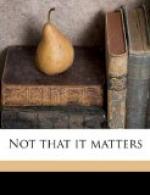There may be other answers to the questions I have asked than the answers I have given, but it is no answer to ask me how the law can be administered without barristers. I do not know; nor do I know how the roads can be swept without getting somebody to sweep them. But that would not disqualify me from saying that road-sweeping was an unattractive profession. So also I am entitled to my opinion about the Bar, which is this. That because it offers material victories only and never spiritual ones, that because there can be no standard by which its disciples are judged save the earthly standard, that because there is no place within its ranks for the altruist or the idealist—for these reasons the Bar is not one of the noble professions.
A Word for Autumn
Last night the waiter put the celery on with the cheese, and I knew that summer was indeed dead. Other signs of autumn there may be—the reddening leaf, the chill in the early-morning air, the misty evenings—but none of these comes home to me so truly. There may be cool mornings in July; in a year of drought the leaves may change before their time; it is only with the first celery that summer is over.
I knew all along that it would not last. Even in April I was saying that winter would soon be here. Yet somehow it had begun to seem possible lately that a miracle might happen, that summer might drift on and on through the months—a final upheaval to crown a wonderful year. The celery settled that. Last night with the celery autumn came into its own.
There is a crispness about celery that is of the essence of October. It is as fresh and clean as a rainy day after a spell of heat. It crackles pleasantly in the mouth. Moreover it is excellent, I am told, for the complexion. One is always hearing of things which are good for the complexion, but there is no doubt that celery stands high on the list. After the burns and freckles of summer one is in need of something. How good that celery should be there at one’s elbow.
A week ago—("A little more cheese, waiter”) —a week ago I grieved for the dying summer. I wondered how I could possibly bear the waiting —the eight long months till May. In vain to comfort myself with the thought that I could get through more work in the winter undistracted by thoughts of cricket grounds and country houses. In vain, equally, to tell myself that I could stay in bed later in the mornings. Even the thought of after-breakfast pipes in front of the fire left me cold. But now, suddenly, I am reconciled to autumn. I see quite clearly that all good things must come to an end. The summer has been splendid, but it has lasted long enough. This morning I welcomed the chill in the air; this morning I viewed the falling leaves with cheerfulness; and this morning I said to myself, “Why, of course, I’ll have celery for lunch.” ("More bread, waiter.”) “Season of mists




